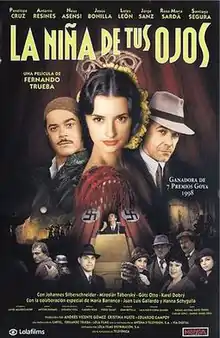The Girl of Your Dreams
The Girl of Your Dreams (Spanish: La niña de tus ojos) is a 1998 Spanish drama film produced and directed by Fernando Trueba. Set during the Spanish Civil War, it centers on a fictional Andalusian actress (Penélope Cruz) making a film in Nazi Germany who becomes the object of Joseph Goebbels' attentions.
| The Girl of Your Dreams | |
|---|---|
 Theatrical release poster | |
| Spanish | La niña de tus ojos |
| Directed by | Fernando Trueba |
| Written by |
|
| Produced by |
|
| Starring | |
| Cinematography | Javier Aguirresarobe |
| Edited by | Carmen Frías |
| Music by | Antoine Duhamel |
Release date |
|
Running time | 121 minutes |
| Country | Spain |
| Languages |
|
Plot
In 1938, while Spain is in the grip of civil war, a film team from territory held by Franco's rebels are invited to the co-production in Berlin of a musical set in 19th-century Andalusia, to be shot in separate Spanish and German versions. At first happy to be working away from their war-torn country, the group find life under Nazism increasingly unpleasant and dangerous.
Macarena, their attractive star, soon catches the eye of Goebbels, the Minister of Public Enlightenment and Propaganda, who is determined to bed her. Though she finds him repulsive, and prefers the company of Blas, the married director of the Spanish version, it is made clear to her that for the sake of the project and of Hispano-German relations she must comply.
When she points out that the extras in the film look ridiculously inauthentic, being tall and fair-haired, they are replaced by short dark Jewish and Romani prisoners from a concentration camp, under armed SS guards. An extra with whom she sympathises, a handsome Russian called Leo, escapes the guards and she smuggles him into the villa where Goebbels has installed her. When Goebbels calls round, Leo knocks him out cold.
Blas realises that this is the end of the road for the project and rushes to see Goebbels' wife, who is well aware of her husband's activities. She writes him a pass enabling Leo, Macarena and her dresser to board a plane that night. The fate of the rest of the group, who are all under arrest, is unclear.
Cast
- Penélope Cruz as Macarena Granada
- Antonio Resines as Blas Fontiveros
- Jorge Sanz as Julián Torralba
- Rosa Maria Sardà as Rosa Rosales
- Santiago Segura as Castillo
- Loles León as Trini Morenos
- Jesús Bonilla as Marco Bonilla
- Neus Asensi as Lucia Gandia
- Miroslav Táborský as Václav Passer
- Johannes Silberschneider as Goebbels
- Karel Dobry as Leo
- Götz Otto as Heinrich von Wermelskirch
- Hanna Schygulla as Magda Goebbels
- María Barranco as Ambassador's wife
- Juan Luis Galiardo as Ambassador
Historical background
During the Civil War, filmmakers from the Nationalist side found work in Germany and Italy. For example, in 1938 at the UFA studios in Babelsberg, the Spanish director Florián Rey filmed Carmen, la de Triana in Spanish and a German version called Andalusische Nächte, both starring the Argentine singer and actress Imperio Argentina with whom, according to legend, Hitler fell in love. She is reported to have sued the producers and director for using her life story without permission.
Accolades
| Year | Award / Film festival | Category | Recipient(s) | Result | Ref(s) |
|---|---|---|---|---|---|
| 1999 | 1999 Goya Awards | Best Film | Won | [1][2] | |
| Best Director | Fernando Trueba | Nominated | |||
| Best Actor | Antonio Resines | Nominated | |||
| Best Actress | Penélope Cruz | Won | |||
| Best Supporting Actor | Jorge Sanz | Nominated | |||
| Best Supporting Actress | Rosa Maria Sardá | Nominated | |||
| Best Original Screenplay | Miguel Ángel Egea and Carlos López | Nominated | |||
| Best New Actor | Miroslav Táborský | Won | |||
| Best Cinematography | Javier Aguirresarobe | Nominated | |||
| Best Editing | Iván Aledo | Nominated | |||
| Best Art Direction | Gerardo Vera | Won | |||
| Best Production Supervision | Angélica Huete | Won | |||
| Best Sound | Pierre Gamet, Dominique Hennequin & Santiago Thévenet | Nominated | |||
| Best Special Effects | Emilio Ruiz & Alfonso Nieto | Nominated | |||
| Best Costume Design | Sonia Grande & Lala Huete | Won | |||
| Best Makeup and Hairstlyes | Antonio Panizza & Gregorio Ros | Won | |||
| Best Original Score | Antoine Duhamel | Nominated | |||
| 1999 Berlin International Film Festival | Golden Bear | Nominated | [3] | ||
Sequel
A sequel, La reina de España (English: "The Queen of Spain"), starring Penélope Cruz and Jorge Sanz, was released on 25 November 2016.
References
- "Ganadores Premios Goya 1999". Academia del Cine (in Spanish). Retrieved 2020-04-04.
- "Nominados Premios Goya 1999". Academia del Cine (in Spanish). Retrieved 2020-04-04.
- "Berlinale: 1999 Programme". berlinale.de. Retrieved 2012-02-02.